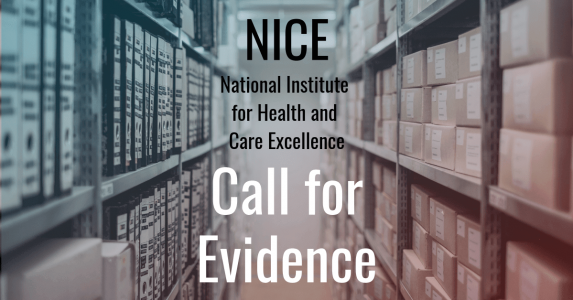The National Institute for Health and Care Excellence (NICE) have put out a call for evidence in relation to the ongoing update of their ME/CFS guidelines, due to be published in October 2020. This is an opportunity to ensure that all relevant information is held by the guideline development committee as they work to assess the evidence and propose recommendations.
At #MEAction UK we are starting to compile relevant studies and data for this submission. NICE are specifically looking for research and cannot accept ‘individual accounts of experience’.
The two areas they are requesting evidence on are:
1. Studies that evaluate:
- Management strategies that are adopted while someone is being assessed for a diagnosis of ME/CFS.
- Methods of monitoring and/or reviewing people with a diagnosis of ME/CFS.
2. Evidence on the experience of people who have had interventions for ME/CFS.
Read below to find out exactly what NICE are looking for. The deadline for submissions is 5pm on Friday 4th October 2019.
NICE have stated:
“We invite registered stakeholders, and other individuals and organisations with an interest to send any relevant published or unpublished information. Details of the information we need and how to submit this are on the guideline web page.”
We encourage anyone who is able to submit relevant evidence, however we understand the limits ME places on cognitive energy, and so we also invite anyone to send in suggestions to uk@meaction.net that we will aim to include in our submission. Please send these suggestions before 23rd September to give our team time to write and review our submission.
NICE give the full details of what evidence they can and cannot accept, as well as explaining how such evidence should be submitted here.
NICE are requesting:
1. Studies that evaluate:
- Management strategies that are adopted while someone is being assessed for a diagnosis of ME/CFS.
- Methods of monitoring and/or reviewing people with a diagnosis of ME/CFS
We are looking for trials that compare different strategies or different methods of monitoring and review. Systematic reviews, randomised controlled trials, non- randomised trials that are prospective or retrospective cohort studies will be considered for inclusion in the guideline.
We would like studies that report measurable outcomes on:
- Mortality
- Quality of life
- Fatigue /fatiguability
- Physical functioning
- Cognitive function
- Psychological status
- Pain
- Sleep quality
- Treatment-related adverse effects
- Activity levels
- Return to school or work
- Exercise performance measures
- Care needs
- Impact on families and carers
We cannot accept non comparative studies, promotional material, non-evidence-based assertions of effectiveness or opinion pieces.
2. Evidence on the experience of people who have had interventions for ME/CFS.
We are looking for evidence that explores and evaluates people’s experience of interventions for ME/CFS. Qualitative studies evaluating focus groups and interviews and surveys will be considered for inclusion in the guideline.
We cannot accept case series, case studies, individual accounts of experience, promotional material, non-evidence-based assertions of effectiveness or opinion pieces.
We are particularly interested in information promoting equality of opportunity relating to age, disability, gender, gender identity, ethnicity, religion and belief, sexual orientation or socio-economic status.
Stop the harm now – #StopGET
#MEAction UK continues to urge NICE to add an interim warning to the current guidelines, covering the time until the new guideline is published, stating that GET and CBT should not be used and can be harmful to people with ME. Read our latest article about this here.




